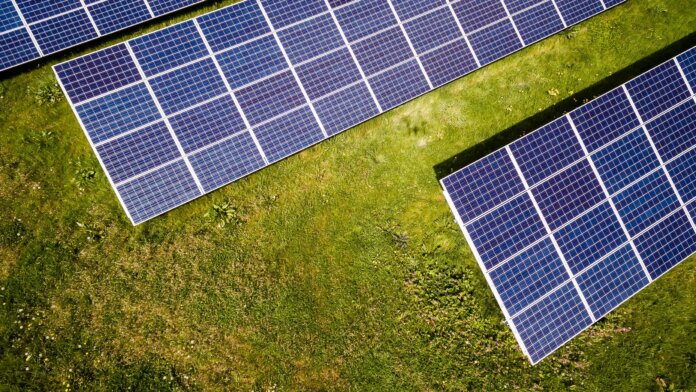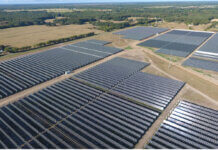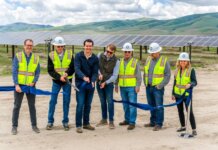President Joe Biden has authorized the use of the Defense Production Act (DPA) to accelerate domestic production of clean energy technologies, including solar panel parts.
With this move, the president has put the full power of federal procurement to work spurring additional domestic solar manufacturing capacity by directing the development of master supply agreements, including “super preference” status.
In addition, Biden is creating a 24-month bridge for certain solar imports while reinforcing the integrity of U.S. trade laws and processes. Specifically, the president is temporarily facilitating U.S. solar deployers’ ability to source solar modules and cells from Cambodia, Malaysia, Thailand and Vietnam by providing that those components can be imported free of certain duties for 24 months in order to ensure the U.S. has access to a sufficient supply of solar modules to meet electricity generation needs while domestic manufacturing scales up.
Together, these actions will spur domestic manufacturing, construction projects and good-paying jobs – all while cutting energy costs for families, strengthening the grid, and tackling climate change and environmental injustice.
Specifically, the president is authorizing the Department of Energy (DOE) to use the DPA to rapidly expand American manufacturing of five critical clean energy technologies: solar panel parts like photovoltaic modules and module components; building insulation; heat pumps; equipment for making and using clean electricity-generated fuels, including electrolyzers, fuel cells and related platinum group metals; and critical power grid infrastructure like transformers.
In deploying the DPA, the Biden-Harris administration will strongly encourage the use of strong labor standards, including project labor agreements and community benefits agreements that offer wages at or above the prevailing rate and include local hire provisions. The administration also will strongly encourage projects with environmental justice outcomes that empower the clean energy transition in low-income communities historically overburdened by legacy pollution.
The White House and DOE will convene relevant industry, labor, environmental justice and other key stakeholders as they maximize the impact of the DPA tools made available by Biden’s actions and strengthen domestic clean energy manufacturing.
Biden is also putting the full power of federal procurement to work spurring additional domestic solar manufacturing capacity. The president directed the development of two innovative tools to accelerate made-in-America clean energy. The master supply agreements for domestically manufactured solar systems will increase the speed and efficiency with which domestic clean electricity providers can sell their products to the U.S. government. The so-called “Super Preferences” will apply to domestic content standards for federal procurement of solar systems, including domestically manufactured solar photovoltaic components, consistent with the Buy American Act.
These federal procurement measures can stimulate demand for up to 1 GW of domestically produced solar modules in the near term, and up to 10 GW over the next decade from U.S. government demand alone. To further increase the impact of these actions, the administration will also partner with state and local governments and municipal utilities in these innovative arrangements – increasing the potential market impact over the next decade to as much as over 100 GW. These procurement actions will provide a significant demand anchor for a revitalized domestic solar manufacturing industry.
As part of the Biden-Harris Permitting Action Plan, a new five-agency collaboration is expediting reviews of clean energy projects on public lands through the Department of the Interior, helping teh U.S. race ahead toward permitting at least 25 GW by 2025. These actions have already increased clean energy permitting activities by 35%, including major solar project approvals and leases. The department has also launched five new Renewable Energy Coordination Offices and reduced rents and fees by more than 50% for solar and wind projects on public lands.
The administration is helping 17 local communities remove red tape with the SolarAPP+ online tool to enable same-day approvals for residential solar installation permits, and an additional 400 interested communities are in the pipeline. The National Climate Task Force launched new initiatives on increasing deployment of Distributed Energy Resources, including rooftop solar, with a focus on bringing the benefits of these projects to underserved communities. The United States Department of Agriculture provided the largest-ever investment in rural renewable energy last year.
In addition, the Department of Energy and the Department of Health and Human Services are partnering to develop and pilot a digital platform that will connect customers who are eligible for the Low Income Home Energy Assistance Program with community solar subscriptions, to further reduce customer energy costs. Likewise, the U.S. Department of Housing and Urban Development is working with municipalities to enable residents of affordable housing to directly benefit from low-cost community solar power without seeing a rent increase or adjustment to their utility allowance.
The government is supporting a diverse solar workforce with good-paying jobs, including pathways to stable careers with the free and fair choice to join a union. Solar industry jobs consistently rank among the top fastest growing in the nation, and many require only a high school education or GED. The Economic Development Administration recently awarded funding to support solar employment training in tribal and coal-impacted communities.
In addition, DOE has issued a Request for Information and hosted six workshops to determine common goals and needs from stakeholders, including industry, unions and training organizations. DOE will continue to explore these issues, including by providing funding, new collaborations with industry, other federal agencies and state-based job boards to develop equitable worker-centric training and education programs, work-based learning opportunities, and support services such as career counseling, mentorship, and job readiness programs.
The Export-Import Bank of the United States (EXIM) Make More in America Initiative, approved by the EXIM board in April, will prioritize investments to expand clean energy manufacturing to promote clean energy domestic manufacturing for export and building capacity in allied nations. The U.S. International Development Finance Corporation supports building resilient clean energy manufacturing supply chains in allied nations around the world, reducing global dependence on China.
The administration has joined forces with the Commonwealth of Puerto Rico to advance dozens of solar energy projects that will enable Puerto Rico to meet its target of 100% renewable electricity, while improving power sector resilience and increasing access to more affordable energy and cleaner air.
Read the full statement here.
Image: Andreas Gücklhorn on Unsplash





All this will do is to drive up the cost of solar in the USA. The DPA was never intended to be a solution to supply chain issues for everyday products, but rather to ensure that these United States have the necessary equipment for the defense of our country in times of war. Inefficient manufacturing techniques, over regulation, and high labor costs will continue to plague American manufacturing. A better solution would be to eliminate the silly restrictions to free trade imposed by the previous administration (at the behest of two poorly managed and failed companies) in a futile attempt… Read more »